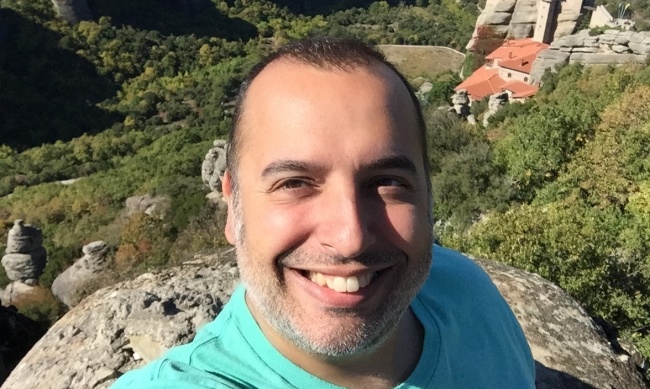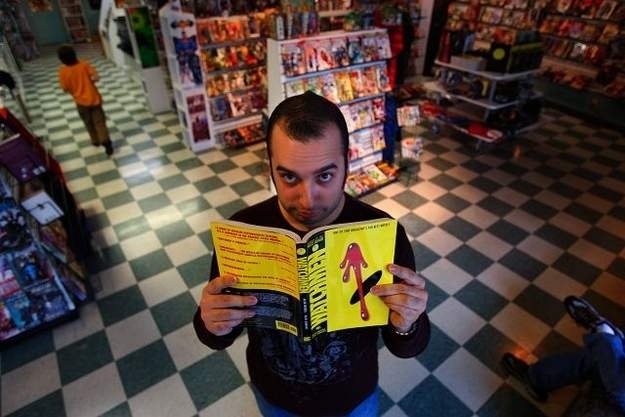If there’s a hat in the comics business, Jim Demonakos has worn it at some point.
Demonakos is perhaps best known as the owner and operator of the Emerald City Comic Con in Seattle, which he started in 2003 and sold to Reed Exhibitions in 2014. But he also helped start four comic stores (and a band!) and pulled a stint as Image Comics’ PR and marketing guy. He’s a serial worker.
That happens when you start by bussing tables. Demonakos’ parents are restaurateurs, and some of his earliest memories revolve around working in the restaurant. Demonakos took a keen interest in computers as well, teaching himself web design in the mid-90s and eventually getting a computer animation degree from the Art Institute in Seattle. He created a major fan site for Erik Larsen’s Savage Dragon, which paid dividends down the line.
These days, Demonakos is out of retail, conventions, and marketing; doing some “light consulting” while percolating his next moves - 2018 should be another big year for him. In his downtime, he shared some of what he’s learned along his interesting and varied path.
THE GOOD
Understand Every Part of a Business
That restaurant experience proved very valuable to Demonakos.
“The entire thing was my parents’ responsibility,” he says. “So, for them, they need to know how to do payroll, manage people, know who takes out the trash. I think it was very important growing up to think about a business from head to toe, not just ‘your part’ of a business.”
Demonakos suggests getting some well-rounded experience before taking the plunge.
“I don’t know that a lot of people, at least initially, understand all aspects of their business,” he says. “They’re usually very specialized.”
Now… Just Do It!
Demonakos had his knowledge base. Then he took a huge roll of the dice.
“I’d have to frequent 4-5 different comic stores to get everything I wanted,” he says. “Some didn’t carry graphic novels, or statues, or T-shirts. Many stores were just single new issues and back issues, and that was the entire store. So maybe I should just open my own store with everything.”
Demonakos grabbed his brother and one of the guys who worked at one of the stores he frequented, and the trio opened The Comic Stop in March 2000 in Seattle. He admits it was a white-knuckle ride at first.
“I moved back in with my parents for two years when I started the store,” he says. “I used literally every dime I had, plus credit cards, to get it off the ground.”
But the lesson, he said, was important.
“If you have something you want to do, just do it,” Demonakos says. “Words are never going to get you anywhere, and if you don’t risk anything, you’ll never get the reward. That’s a lesson I learned early on.”
You’re Never Too Good for Any Job
With all his capital on the line, elbow grease became a way Demonakos kept the lights on. And he learned that even the boss can do the smallest of tasks.
“This is a thing that keeps you grounded,” he says. “If everyone else in your organization watches you do every job, and you’re never like, ‘Oh, I’m going to delegate this because it’s crap work,’ that leaves a good impression on everybody. It automatically levels any barriers. Yes, I will take out the trash. It’s important.”
Demonakos did it back in the day, and the mindset continues to this day.
“Every single job, I’d do it. We need to get these T-shirts folded? Okay, I’ll do it,” he says. “If it’s a job that needs to get done, it’s good enough for you to do. You are not too big for it.”
THE BAD
Don’t Bite Off More Than You Can Chew
Demonakos was already a serial entrepreneur when he received an interesting phone call.
“Erik Larsen reached out to me when he was the publisher at Image,” Demonakos says. “I flew down to San Francisco for an interview as their PR and marketing person. I said, ‘Hey, I already have the Emerald City con and these stores which keep me busy,’ and they said, ‘That’s exactly why we want you.’”
Demonakos took the bait, and took the job. He lasted 18 months at it.
“It was a really good time, but I definitely bit off more than I could chew,” he says today. “I was still trying to be involved in the stores, and I was running Emerald City remotely, and then I was doing my full-time job at Image. It was more like three full time jobs!”
Demonakos finally found a grind he couldn’t handle.
“Not only was it PR and marketing, but I was doing all the book market stuff, which was on the grow at the time and still continues to grow, and also their foreign licensing,” he says. “I was wearing, like, seven hats. I literally would work on the BART [commuter train] on the way to and from work, go home, eat, and keep working until I passed out. Then I would get up the next morning and start again. That was my weekends, too. I had no life! I just worked. I’m not saying I’d recommend that.”
He Who Hesitates Is Lost
The Emerald City con was humming for Demonakos, and he was looking for a natural extension. He waited too long.
“I was looking to expand by doing a convention in another city,” he says. “I had a partner who also ran shows and he was up for it as well. But we kept talking about it and kept focusing so much on the negative, that a year later, we were still having that conversation.”
Demonakos and his almost-partner let that delay take them out of the game.
“Eventually, someone else just started a show in that city and really took over,” he says. “So that whole time we were hemming and hawing, someone else went to the good side of that proposition and did it. I realized that if you have an idea, and you think it’s a good enough idea, and you weigh the risks to be just enough to give it a shot… do it. Otherwise, someone else who is a little less risk-adverse than you is going to do it.”
Beware Loyalty
It’s a fine line to walk: Loyalty is a positive quality, but it has to be reciprocated.
“Loyalty and friendship can really screw you over,” Demonakos muses. “I’ve kept people on the payroll long after I should have, because I’ve felt obligated to someone who’s been around for a long time. But at a certain point, you have to realize that what you’ve really been doing is making excuses for them, for sometimes years, and it’s only affected your business negatively.”
Recognizing that fork in the road is comparatively easy. Do something about it is harder.
“I know one of my weaknesses is confrontation,” Demonakos says. “I’m a friendly guy, I’m a happy dude. I deplore confrontation. It’s something I have got better at, but especially early on, I would rather let something go than have a hard conversation about it. And that’s a hard lesson.”
But he now knows “doing something about it” is a path you have to take.
“It’s so difficult to look at someone who helped you build a business and realize that they took a left turn at some point, while everyone else went right,” Demonakos says. “And that lesson can be painful. Some of the worst conversations I’ve had are conversations I should have had literally years earlier.”
AND WHAT ELSE?
“I had taught myself web design well enough that I would do it freelance, and in the tech boom, the money I made, $60 an hour back in 1998, helped fund opening a comic book store. That, and a couple of credit cards.”
“Two months after opening my first store [in 2000], Erik Larsen came in for a signing. It took me two years to make more money in a single day at the store than I did that day. That put us on the map.”
“In 2002, we opened our second store. We went to a mall and wanted to rent a kiosk for 2-3 months over the holidays, basically to advertise the main store and get some holiday sales. They told us that for just $100 more, we could get an entire 1100 square-foot store. They had a bunch of empty spots, and they would even do it month to month. We could still close the store after three months, no long-term lease! It was a pretty sweetheart deal. So we did that, and the second store really took off as well. It was a very good time.”
“By the end of 2002, I was already getting a little bored, if the truth be told. I had already ‘figured out’ what the comic store is, if you get my drift. It just wasn’t a challenge. I had been going to shows, San Diego or Wizard Chicago, and I’d come back to Seattle and just couldn’t figure out why there can’t be a big show here with so many thriving stores here. So that was the seed that Emerald City came from.”
“I got to know a lot of creators by going to other shows, really started to become friends with them. I felt like I could say, ‘Hey, would you come do a show here if I invited you?’ and they would say yes. And… I’ll be honest. I approached the guy who did a small show here and asked him about partnering up, and I consider myself so fortunate he said ‘no.’ I feel in retrospect, it would have been a bad thing to have been partnered with someone who had a smaller view of what shows could be, and especially seeing what Emerald City became.”
“Long story short, I went back to the guys at the stores and said, ‘I think we should do a convention. I mean, how hard could it be?’ And for the longest time, I was not able to live those words down. Because we found out how hard it could be! But I still argue to this day that it wasn’t really hard, it was just a lot of work. Those two things are adjacent to each other, but not the same thing.”
“Staring in 2009, I started Kirby Krackle with Kyle [Stevens]. So we had a band as well.”
“Emerald City didn’t f---ing pay the bills for years. Emerald City was a break-even proposition for its first seven years. So basically, until 2010, I was working a whole other job to support working on Emerald City. But it’s important to understand that not everything is an overnight success.”
“I don’t consider failures ‘failures.’ By the strict definition of ink on paper, I’ve had businesses that are failures. But I look at them as just really expensive lessons. And I’ve learned so much from them. And I’ve never made the same mistake twice.”
“It’s okay to be your own boss. In high school and college, the goal is usually to get on a career path, target a job, and get your 9-to-5. So mostly, the goal is you’re going to work for someone else. But from my earliest days on, I had the best role models in that my parents didn’t have bosses. They were their own boss, so I saw that I could be, too. That seemed totally a reasonable thing, right from the start. And I think that can be a mental hump for some people to get over. You actually can do this yourself.”
“Quality is the best business plan. To the extent that Emerald City, Kirby Krackle, or Comic Stop were successes, the common root is quality. I made a comic book store that fulfilled the output of four comic stores in one. It was the kind of store I wanted to shop at, and it turned out other people wanted to shop at it as well. Emerald City was ‘What guests, dealers, publishers, were good in the industry? What would I want to see?’ And it turned out other people wanted to see that as well. The whole premise of Kirby Krackle was to make real, actual songs you could hear in the radio that were fun and poppy, that were nonetheless nerd music as well. It was saying, ‘Do it well, and other people will come to it as well.’ This is a very big thing to me. Focus on the quality. Quality should be your business plan.”
See more images in the gallery below!





 View Gallery: 4 Images
View Gallery: 4 Images